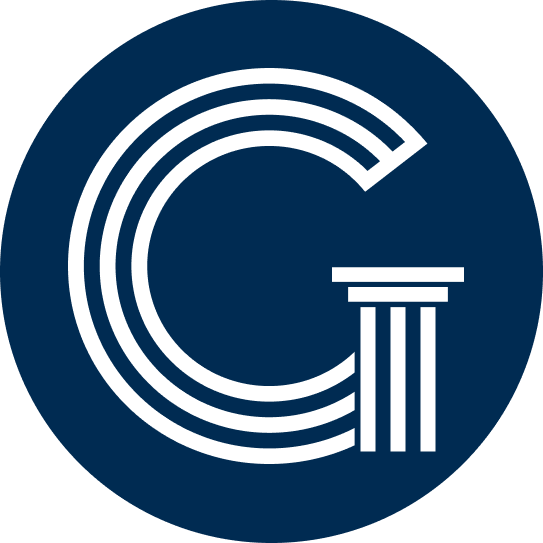- Concord Campus - (925) 687-9555
- Fresno Campus - (559) 222-1903
- Modesto Campus - (209) 521-1821
- Sacramento Campus - (916) 588-2060
- San Jose Campus - (408) 384-7050
- Van Nuys Campus - (747) 200-4567
- Concord Campus - (925) 687-9555
- Fresno Campus - (559) 222-1903
- Modesto Campus - (209) 521-1821
- Sacramento Campus - (916) 588-2060
- San Jose Campus - (408) 384-7050
- Van Nuys Campus - (747) 200-4567
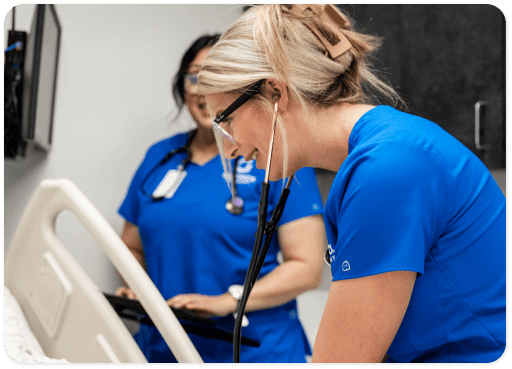
- Fresno, CA via Distance Education
8 Months Program*
Distance Education
Job Placement Assistance
Veteran and Military Benefits
*82 Approved Instructional Weeks include Technical Courses taken before enrolling in the 30 Weeks of General Education courses at Gurnick Academy of Medical Arts.
| Student Tuition Recovery Fund (Non-Refundable) | $0.00 |
| Registration Fee (Non-Refundable) | $100.00 |
| Books (Non-Refundable, if accessed) | $225.00 |
| Tuition Fee | $19,800.00 |
|
TOTAL PROGRAM COST* *Program Fees are subject to change |
$20,125.00 |
Please Note
The Associate of Science in Vocational Nursing program is intended for students who have graduated from a Board-approved Vocational Nurse program from an accredited institution or successfully completed a minimum of 1,530 clock hours of BVNPT-approved curriculum for the VN program with a GPA of 2.5 or above. Please consider enrolling in our Vocational Nurse program if you do not meet these requirements.
About the A.S. in Vocational Nursing Program
Program Mission
Gurnick Academy of Medical Arts’ mission is to offer quality allied health and nursing programs that integrate professional skills, career-focused education, and hands-on practical experience by empowering students to develop and achieve their personal and career goals.
Program Description
Gurnick Academy of Medical Arts’ Vocational Nursing graduates joins a career in the growing healthcare field. Vocational nurses provide primary medical care under the direction of registered nurses and doctors. They monitor patients’ health, discuss care with patients, keep records, and administer primary care, including changing bandages and inserting catheters.
The Associate of Science in Vocational Nursing Program is a two-semester program for graduates of an approved Vocational Nursing or Practical Nursing program who wish to obtain an Associate of Science Degree.
The program builds on the vocational nursing diploma program by adding the same general education courses to our Associate of Science in Nursing Program (ADN).
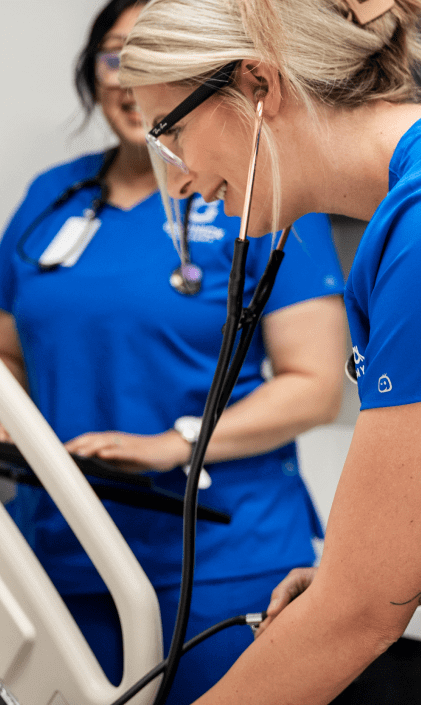

Program Goals and Objectives
Incorporate nursing, behavioral, and physical sciences principles to provide competent care to clients of different ages with different biopsychosocial needs.
Apply knowledge of specific disease conditions in clients’ prevention, treatment, nursing care, and rehabilitation.
Differentiate the role of the Vocational Nurse within the medical team.
Adhere to professional standards incorporating a Vocational Nurse’s legal and ethical responsibilities.
Utilize critical thinking in assessing, planning, intervening, and evaluating client care within the scope of Vocational Nurse practice.
Effective communication demonstrates organization, prioritization, delegation, and collaboration with healthcare professionals.
Prepare the Associate Degree student with the knowledge, skill, and ability to administer safe, ethical, and competent nursing care as a beginning practitioner in various settings.
Diagnostic Medical Imaging Program Overview
*(82 Approved Instructional Weeks include Technical Courses taken before enrolling in the 30 Weeks of General Education courses at Gurnick Academy of Medical Arts.)
The program information, length, and schedule may change. Make sure to read the accompanying Catalog and Addendum for changes and updates. Check in with an Admission Advisor for details. The expected program length is 30 weeks to complete all 33 semester credit hours of online General Education courses after receiving transfer credit for 57.5-semester credits of a prior Vocational Nursing or Practical Nursing program. Graduates earn 90.5 semester credit hours and an Associate of Science Degree in Vocational Nursing.
Requirements
- Admission Requirements
- Performance Requirements
- Graduation Requirements
Please review the following requirements: General Admission Requirements for all programs.
- All general education courses must meet the baseline criteria of general education criteria for the California State University system (CSUs).
- Please note: A transcript MUST be provided for the above prerequisites if credit granting and will only be accepted from an accredited institution approved by the US Department of Education.
- Copies are not accepted. All coursework must be completed with a grade of at least a “C.”
- Applicant must have a cumulative grade point average (GPA) of 2.5 (on a 4-point scale) or higher in Vocational or Practical Nursing coursework. Official transcripts are required.
- Provide proof of graduation from a Board-approved Vocational Nursing Program from an accredited institution or have successfully completed a minimum of 1,530 clock hours of BVNPT-approved curriculum hours for the VN Program.
- All general education courses must meet the baseline criteria of general education criteria for the California State University system (CSUs).
Each program has specific physical and non-physical requirements to ensure our students’ and patients’ safety and welfare. Almost all of our students (check with an Admission Advisor if applicable) must be able to:
- Handle stressful situations related to technical and procedural standards and patient care situations.
- Respond quickly and appropriately to emergencies using the English language.
- Communicate effectively with patients and staff in clear English in verbal and written forms.
- Read and interpret (or learn how to) patient charts and requisitions.
- Tolerate strong, unpleasant odors.
- Provide physical and emotional support to the patients during procedures.
- Report clearly and legibly through progress notes in patient charts.
- Meet class standards for successful course completion.
- Collect, interpret, and integrate data about patients.
- Recognize and respond appropriately to individuals of all ages, genders, and races from all socioeconomic, religious, and cultural backgrounds.
- Cope with the stress of heavy workloads, demanding patients, and life-threatening clinical situations.
- Recognize and respond appropriately to potentially hazardous situations.
- Demonstrate the physical and emotional capacity to work a 40-hour week on the clinical rotation.
- Behave in an ethical, sound, competent, compassionate, and professional manner in the classroom and the clinic.
- Lift/carry:
- 1 pound (0.45 kg) — 5 pounds (2.27 kg) frequently — image receptors, lead aprons, files.
- 20 pounds (9.07 kg) — 50 pounds (22.68 kg) occasionally — patient transfers and positioning.
- 50-70 lbs. rarely to occasionally — patient transfers.
- Stand and walk for up to eight (8) hours per day.
- Carry a minimum of 20 pounds (9.07 kg) while walking a distance of 100 feet (30.48 m).
- Bend or flex the upper trunk forward up to 45 degrees and the lower torso into a squatting position.
- Rotate the upper trunk up to 30 degrees to the right and left.
- Reach at least 72 inches (1.83 m) above floor level or an entire arm’s reach.
- Utilize the sense of hearing to communicate effectively with the patients and the healthcare team.
- Utilize the sense of vision in all hospital lighting levels, ranging from low illumination levels to bright light levels.
- Sit in class for up to six (6) hours per day.
- Palpate anatomical structures and handle injured body parts without causing injury to the patient.
- During exercise, give manual resistance to a patient’s arm, leg, or trunk.
- Move with adequate agility and speed to ensure patient safety.
- Walk and balance well enough to help patients walk and transfer with or without equipment while preventing injury to patients and themselves.
- Safely grasp and manipulate small objects and set dials on electrical equipment.
- Use visual, auditory, and tactile senses to observe patients and collect and interpret data.
- Respond to warning sounds, machine alarms, and calls for help.
The following requirements must be met for a student to graduate from the A.S. in Vocational Nursing program at Gurnick Academy of Medical Arts:
- The successful completion of all program courses and hours.
- All financial obligations, including tuition and textbook charges, have been met.
Please review the following requirements: General Admission Requirements for all programs.
- All general education courses must meet the baseline criteria of general education criteria for the California State University system (CSUs).
- Please note: A transcript MUST be provided for the above prerequisites if credit granting and will only be accepted from an accredited institution approved by the US Department of Education.
- Copies are not accepted. All coursework must be completed with a grade of at least a “C.”
- Applicant must have a cumulative grade point average (GPA) of 2.5 (on a 4-point scale) or higher in Vocational or Practical Nursing coursework. Official transcripts are required.
- Provide proof of graduation from a Board-approved Vocational Nursing Program from an accredited institution or have successfully completed a minimum of 1,530 clock hours of BVNPT-approved curriculum hours for the VN Program.
Each program has specific physical and non-physical requirements to ensure our students’ and patients’ safety and welfare. Almost all of our students (check with an Admission Advisor if applicable) must be able to:
- Handle stressful situations related to technical and procedural standards and patient care situations.
- Respond quickly and appropriately to emergencies using the English language.
- Communicate effectively with patients and staff in clear English in verbal and written forms.
- Read and interpret (or learn how to) patient charts and requisitions.
- Tolerate strong, unpleasant odors.
- Provide physical and emotional support to the patients during procedures.
- Report clearly and legibly through progress notes in patient charts.
- Meet class standards for successful course completion.
- Collect, interpret, and integrate data about patients.
- Recognize and respond appropriately to individuals of all ages, genders, and races from all socioeconomic, religious, and cultural backgrounds.
- Cope with the stress of heavy workloads, demanding patients, and life-threatening clinical situations.
- Recognize and respond appropriately to potentially hazardous situations.
- Demonstrate the physical and emotional capacity to work a 40-hour week on the clinical rotation.
- Behave in an ethical, sound, competent, compassionate, and professional manner in the classroom and the clinic.
- Lift/carry:
- 1 pound (0.45 kg) — 5 pounds (2.27 kg) frequently — image receptors, lead aprons, files.
- 20 pounds (9.07 kg) — 50 pounds (22.68 kg) occasionally — patient transfers and positioning.
- 50-70 lbs. rarely to occasionally — patient transfers.
- Stand and walk for up to eight (8) hours per day.
- Carry a minimum of 20 pounds (9.07 kg) while walking a distance of 100 feet (30.48 m).
- Bend or flex the upper trunk forward up to 45 degrees and the lower torso into a squatting position.
- Rotate the upper trunk up to 30 degrees to the right and left.
- Reach at least 72 inches (1.83 m) above floor level or an entire arm’s reach.
- Utilize the sense of hearing to communicate effectively with the patients and the healthcare team.
- Utilize the sense of vision in all hospital lighting levels, ranging from low illumination levels to bright light levels.
- Sit in class for up to six (6) hours per day.
- Palpate anatomical structures and handle injured body parts without causing injury to the patient.
- During exercise, give manual resistance to a patient’s arm, leg, or trunk.
- Move with adequate agility and speed to ensure patient safety.
- Walk and balance well enough to help patients walk and transfer with or without equipment while preventing injury to patients and themselves.
- Safely grasp and manipulate small objects and set dials on electrical equipment.
- Use visual, auditory, and tactile senses to observe patients and collect and interpret data.
- Respond to warning sounds, machine alarms, and calls for help.
The following requirements must be met for a student to graduate from the A.S. in Vocational Nursing program at Gurnick Academy of Medical Arts:
- The successful completion of all program courses and hours.
- All financial obligations, including tuition and textbook charges, have been met.
Career Services

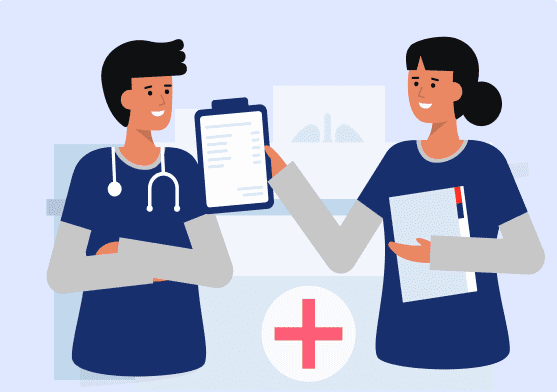




A.S. in Vocational Nursing Degree Program Outline
| Course Number | Title | Clock Hours | Semester Credit Hours |
|---|---|---|---|
| GE 020A | Human Body in Health and Disease I with Lab | 75.0 | 4.0 |
| GE 041 | General Microbiology with Lab | 75.0 | 4.0 |
| GE 222 | English Reading and Composition | 45.0 | 3.0 |
| GE 112 | Algebra I | 45.0 | 3.0 |
| GE 202 | General Psychology | 45.0 | 3.0 |
| GE 020B | Human Body in Health and Disease II with Lab | 75.0 | 4.0 |
| GE 031 | Nutrition in Health & Disease | 45.0 | 3.0 |
| GE 110 | Critical Thinking | 45.0 | 3.0 |
| GE 201 | Introduction to Sociology | 45.0 | 3.0 |
| GE 240 | Public Speaking, Basics of Effective Communication | 45.0 | 3.0 |
| Total | 540.0 | 33.0 |
Read the A.S. in Vocational Nursing Program Course Descriptions.
Minimum Requirements for Enrolling in Distance Education
Minimum Student Skills
Students are expected to have at least the following skills before taking distance education courses:
- Basic Keyboarding competence.
- Elementary knowledge of their computer operating system.
- Basic knowledge of:
- Word processing.
- Sending and receiving emails with attachments.
- Using an internet browser and a search engine.
Minimum Hardware Requirements
- Access to a modern Windows 10 or macOS computer. Don’t hesitate to contact IT support with questions about other operating systems.
- Internet access with a high-speed broadband connection.
- Internet service provider for home access or access from work (must have before starting the course).
- Access to the distance education environment for at least ten (10) hours per week.
- Students must be able to video conference in real time. Appropriate equipment may include:
- Camera (could be built into the laptop).
- Microphone (could be built into the laptop).
Minimum Software Requirements
- Google Chrome internet browser.
- An office suite tool such as Google Docs, Microsoft Office 365, LibreOffice, or Apache Open Office.
- One or more courses may require special plug-ins to access streaming media, PDF files, or other web components.
- Antivirus software such as Microsoft Defender.
- A conferencing tool such as Google Hangouts or Zoom.
Accreditation and Approval
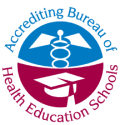
Gurnick Academy of Medical Arts holds national institutional accreditation by the Accrediting Bureau of Health Education Schools (ABHES). ABHES accreditation does not include continuing education courses.
ABHES Mailing Address:
6116 Executive Blvd., Suite 730
North Bethesda, MD 20852
ABHES Phone: 301-291-7550
ABHES Email: Info
ABHES Website: abhes.org
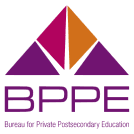
Gurnick Academy of Medical Arts is a private institution approved to operate by the California Bureau for Private Postsecondary Education. Approval to operate means the institution is compliant with the minimum standards in the California Private Postsecondary Education Act (CPPEA) of 2009 (as amended) and Division 7.5 of Title 5 of the California Code of Regulations. CPPEA governs the Bureau for Private Postsecondary Education.
The Office of Student Assistance and Relief is available to support prospective students, current students, or past students of private postsecondary educational institutions in making informed decisions, understanding their rights, and navigating available services and relief options. The office may be reached by calling (888) 370- 7589, option #5, or by visiting osar.bppe.ca.gov.
BPPE Mailing Address:
1747 N. Market Blvd., Suite 225
Sacramento, CA 95834
BPPE Phone: 888-370-7589
BPPE Email: General
BPPE Website: bppe.ca.gov
Financial Aid
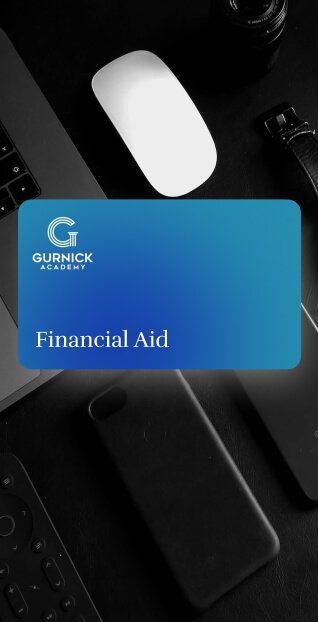
Gurnick Academy of Medical Arts aims to help every student obtain Financial Aid* to attend their chosen program. Gurnick Academy of Medical Arts participates in various federal and state student financial assistance programs.
The financial aid programs are designed to assist students with inadequate financial resources to meet their education’s total cost. Each campus has a Financial Aid Advisor who can help students with any financial aid questions.
For more information, please visit our Financial Aid page.
*for those who qualify
A.S. in Vocational Nursing Program FAQs
Please choose from the dropdown to review a category of FAQs
-
Please find the program length and schedule at top of this page?
-
According to Career Profiles, an Associate Degree in Nursing (ADN) or Associate of Science in Nursing (ASN) are two-year degrees for those seeking to become Registered Nurses.1 While Bachelor Degrees in Nursing (BSNs) are four-year programs for those seeking to become Registered Nurses.*1 Both the ADN/ASN and BSN degrees qualify students to sit for the NCLEX-RN exam and apply for RN licensure.1
According to Career Profiles, ADN programs generally focus more on practical skills, while BSN programs delve more deeply into theoretical knowledge. However, the core curriculum for both programs is typically quite similar, with courses in community health nursing, gerontological nursing, pediatrics, maternal and newborn nursing, and psychiatric nursing. BSN programs include courses not offered in ADN programs, such as nursing technology, research, and informatics.1
*There are several accelerated programs (fast-track or bridge) that may truncate this timeframe.
Citations:
1^a, b, c “Associate Degree in Nursing (ADN/ASN).” Www.careerprofiles.info. Career Profiles. 2022. (Accessed June 7, 2022.) -
With careful time management, many students have maintained part-time employment and have completed the program. Please find more info in the Catalog and Addendum.
-
The program is considered a full-time program.
Have Questions? We are here to help!
Apply Now Form
External Resources for the A.S. in Vocational Nursing Program
If you are a person who is deaf, hard of hearing, or speech-disabled, please Dial 711 to place a call through California Relay.
